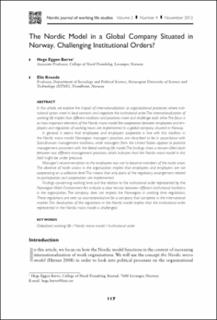| dc.contributor.author | Børve, Hege | |
| dc.contributor.author | Kvande, Elin | |
| dc.date.accessioned | 2020-06-10T11:09:48Z | |
| dc.date.available | 2020-06-10T11:09:48Z | |
| dc.date.created | 2012-12-04T08:54:18Z | |
| dc.date.issued | 2012 | |
| dc.identifier.citation | Børve, H. & Kvande, E. (2012). The Nordic Model in a Global Company Situated in Norway. Challenging Institutional Orders? Nordic Journal of Working Life Studies, 2(4), 117-134. doi: | en_US |
| dc.identifier.issn | 2245-0157 | |
| dc.identifier.uri | https://hdl.handle.net/11250/2657530 | |
| dc.description.abstract | In this article, we explore the impact of internationalization as organizational processes where institutional actors meet in local contexts and negotiate the institutional order. The internationalization of working life implies that different traditions and practices meet and challenge each other. The focus is on how important elements of the Nordic micro model like cooperation between employees and employers and regulation of working hours are implemented in a global company situated in Norway. In general, it seems that employees and employers cooperate in line with this tradition in the Nordic micro model. Norwegian manager’s practices are described to be in accordance with Scandinavian management traditions, while managers from the United States appear to practice management consistent with the liberal working life model. The findings show a tension-filled clash between two different management practices, which indicates that the Nordic micro model in this field might be under pressure. Manager’s recommendation to the employees was not to become members of the trade union. The absence of trade unions in the organization implies that employees and employers are not cooperating on a collective level. This means that only parts of the regulatory arrangement related to participation and cooperation are implemented. Findings concerning working time and the relation to the institutional order represented by the Norwegian Work Environment Act indicate a clear tension between different institutional traditions in the organization. The company does not respect the Norwegian in working time regulations. These regulations are seen as counterproductive for a company that competes in the international market. This devaluation of the regulations in the Nordic model implies that the institutional order represented in the Nordic micro model is challenged. | en_US |
| dc.language.iso | eng | en_US |
| dc.rights | Navngivelse-Ikkekommersiell-DelPåSammeVilkår 4.0 Internasjonal | * |
| dc.rights.uri | http://creativecommons.org/licenses/by-nc-sa/4.0/deed.no | * |
| dc.title | The Nordic Model in a Global Company Situated in Norway. Challenging Institutional Orders? | en_US |
| dc.type | Peer reviewed | en_US |
| dc.type | Journal article | en_US |
| dc.description.version | publishedVersion | en_US |
| dc.rights.holder | © 2012 The Author(s) | en_US |
| dc.subject.nsi | VDP::Samfunnsvitenskap: 200::Statsvitenskap og organisasjonsteori: 240 | en_US |
| dc.subject.nsi | VDP::Samfunnsvitenskap: 200::Sosiologi: 220 | en_US |
| dc.source.pagenumber | 117-134 | en_US |
| dc.source.volume | 2 | en_US |
| dc.source.journal | Nordic Journal of Working Life Studies | en_US |
| dc.source.issue | 4 | en_US |
| dc.identifier.doi | 10.19154/njwls.v2i4.2307 | |
| dc.identifier.cristin | 967626 | |

